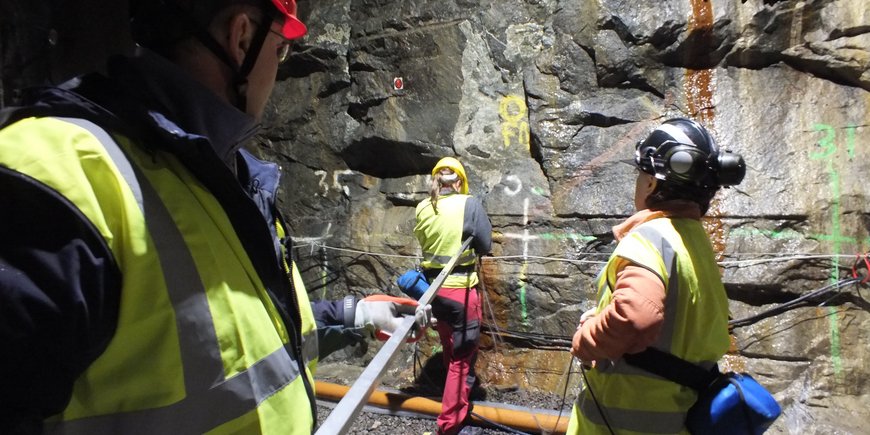11. 06. 2015| Äspö/Sweden: A group of researchers under the lead of Dr. Arno Zang (GFZ German Research Centre for Geosciences GFZ), carries out a multidisciplinary hydraulic experiment in the Hard Rock Laboratory in Äspö, Sweden, at a depth of 410 meters. The overall aim is to enhance the technology of geothermal energy extraction from deep rock.
Most of the Earth’s heat can only be recovered by means of stimulation techniques called Enhanced Geothermal Systems (EGS). To better understand the behavior of the deep rock during EGS, the Helmholtz research group conducts experiments at a small scale in the so called Hard Rock Laboratory (HRL) in Äspö. The main focus is on minimizing the acoustic and seismic effects of EGS that go along with such intervention in deep rock.
Since 2001, conventional hydraulic fracturing experiments for stress determination have been carried out at Äspö. In the new project „Nova 54-14-1“, previous tests are repeated but this time with innovative high resolution-high sensitive acoustic, seismic, and electromagnetic monitoring. The advantages in Äspö are the well-known stress state and an excellent data base for granitic rock mass that can be used.
The project is a joint collaboration between Nova FoU in Oskarshamn, GFZ German Research Centre for Geosciences, and Karlsruhe Institute of Technology KIT in Karlsruhe, Germany.









![[Translate to English:] Torsten Sachs in front of a climate station on a field](/fileadmin/_processed_/3/9/csm__TorstenSachs_bearbeitet_GS_4a1365ef84.jpeg)

![[Translate to English:] left image flood at the Ahrtal: image from above, several houses are flooded; left image:: Heidi Kreibich;](/fileadmin/_processed_/4/4/csm_Bild2_9af0130e9f.png)



![[Translate to English:] Start der Vega Rakete](/fileadmin/_processed_/6/4/csm_20231201-kachel_Vega-VV23-launch_ESA-CNES-Arianespace_706716b68c.jpeg)









![[Translate to English:] Poster exhibition at the Brandenburg Hydrogen Day at the GFZ, some participants in the foreground](/fileadmin/_processed_/6/5/csm_Erster_Brandenburgischer_Wasserstofftag_GFZ_402fcec95e.jpeg)
![[Translate to English:] Group picture of the participants](/fileadmin/_processed_/9/4/csm_20231108_CAWa-Workshop-Tashkent_Gruppenbild_99ea779d8a.jpeg)

![[Translate to English:] [Translate to English:] Hörsaal](/fileadmin/_processed_/e/6/csm_H%C3%B6rsal_e21ac645fb.jpeg)


![[Translate to English:] The Delegations in the Historic Library on the Telegrafenberg. In the back there are from left to right, the Dutch Ambassador for Germany, Ronald van Roeden, the Dutch Minister for Education, Culture and Science, Robbert Dijkgraaf and the scientific director of the GFZ, Susanne Buiter.](/fileadmin/_processed_/d/b/csm_Kachel-2_9eba4b4212.jpeg)

